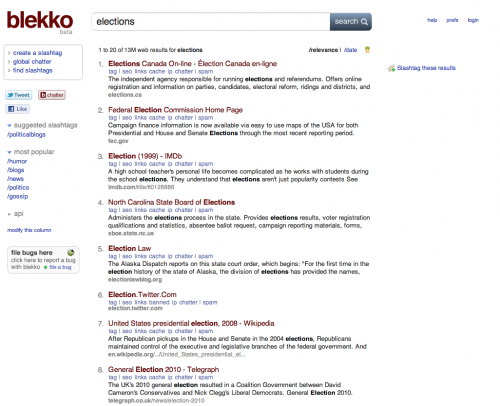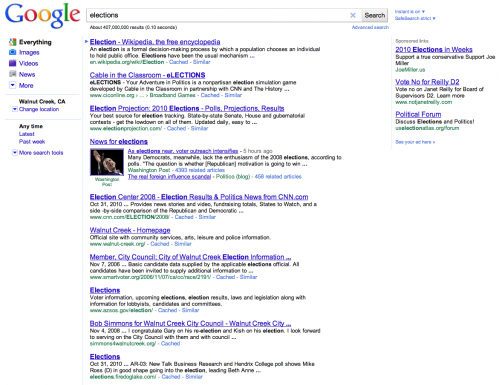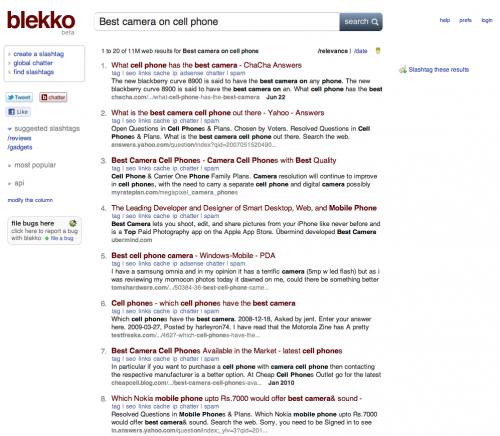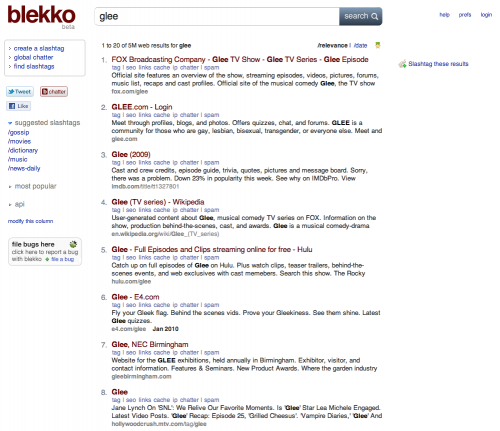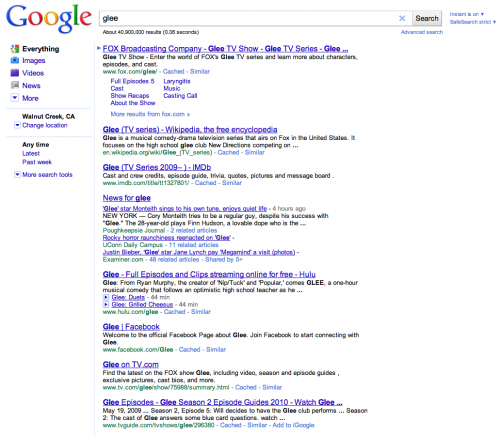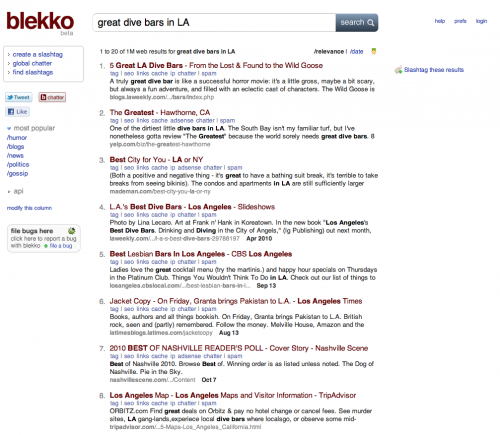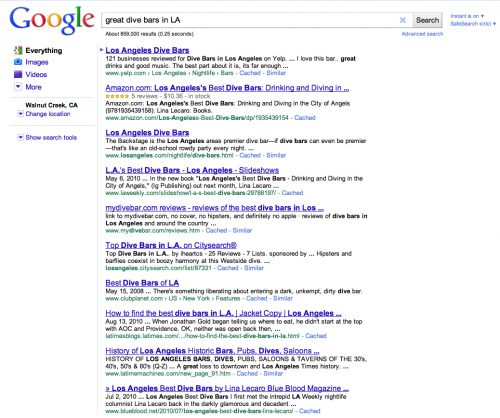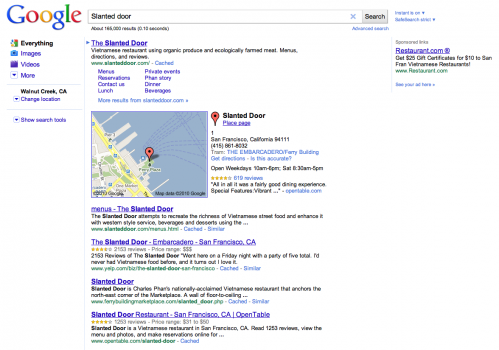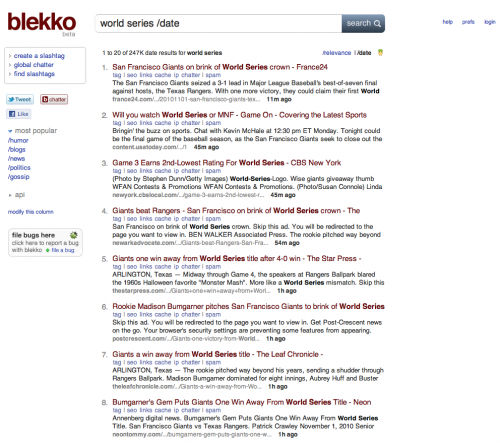Google And Blekko Head-To-Head: Blekko Lives To Fight Another Day
What’s immediately clear from conducting a lot of searches on both Blekko and Google in a concentrated period of time is that the upstart has built a credible search engine that people can use today with a good success. (For a general overview see Blekko, The “Slashtag” Search Engine, Goes Live.) However in a head-to-head […]
What’s immediately clear from conducting a lot of searches on both Blekko and Google in a concentrated period of time is that the upstart has built a credible search engine that people can use today with a good success. (For a general overview see Blekko, The “Slashtag” Search Engine, Goes Live.) However in a head-to-head comparison I found that — today — Google is generally better in ways that matter to mainstream users.
There are also secondary features on Google that are highly useful and don’t appear on Blekko. For example, sitelinks and universal search have become staples of the search-user experience. And Google’s more “visually rich” presentation of certain categories of results (e.g., local) is often superior as well.
In cases where topical or time-based results are more important or relevant (“elections,” “world series”) Google also proved generally better. However the “/date” filter (slashtag) improved results dramatically on Blekko in those instances.
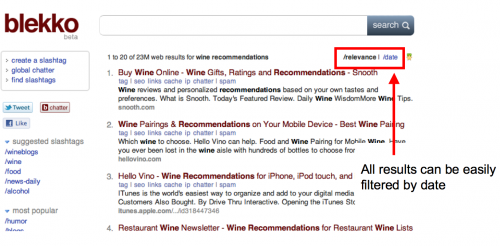
Time-based filtering can be done on Google of course though the link is a bit buried in the left nav. Google also factors recency into general relevance in many instances.
On with the show
Below I reproduce a few of the queries I looked at this morning and make some general comments about relevance and accuracy of the top listings in each case. At the end I offer some general thoughts about Blekko’s potential and why it’s likely to get better with time — like red wine.
Query: “Elections”
Comments: If I’m not interested in the 1999 film “Election” but interested in the forthcoming US midterm elections both engines do a poor job of serving that intent. Google does a slightly better job with the query “elections” than Blekko, offering links to news articles among the top results. Otherwise the information presented is quite broad and only marginally relevant to my intention.
In Blekko’s case the top result is a Canadian site, which would be fine — if I were in Canada. However, as mentioned, using the “/date” tag to filter results greatly improves the Blekko showing, which now includes lots of news content about the 2010 elections.
With Google I cheated a bit because Instant Search would have shaped my query with choices such as “elections 2010,” taking me quickly to more relevant results.
Query: “Best camera on cell phone”
Comments: Here Google wins easily. Blekko offers a number of forums and social media sites (ChaCha, Yahoo Answers) in the top positions. Clicking through you find there’s little substance or authoritative content among these first few links. Google has better results that link to a number of review sites (e.g., CNET) and blogs that offer in-depth information and lists of the best camera phones.
Query: “Glee” (the Fox TV show)
Comments: The top results on the two sites are largely comparable. However Google (via universal search) offers a greater range of content on the first page, and the sitelinks for the official Fox Glee site allow users to get more quickly to desired information and content.
Query: “Great dive bars in LA”
Comments: The top results are comparable. Google’s first result is a link to a Yelp list of dive bars in a LA and then to a book about the subject from Amazon. Blekko links to an LA Weekly article, which also features a list of LA dive bars. It doesn’t show the Yelp link on the first page, however. There are also some irrelevant or only marginally relevant links in the Blekko results, including an article focused on “best of” lists for Nashville, Tennessee and one comparing New York and LA but without any substantive discussion of bars.
Query: “Slanted Door”
Comments: Blekko’s results are good and the popular San Francisco restaurant’s website is the first link, followed by several review sites. However Google offers a wider range of information and shows contact information on the first page making the Google experience better in this case.
Query: “World Series”
Comment: Looking at just the results for the query “world series,” Google wins easily. It features last night’s results and next game schedule in the “one box” at the top. There are also links to news stories about the game at the top of the page. The top result on Blekko is to MLB.com (Major League Baseball) but then results relate to the phrase “world series” but have little to do with baseball. Once again, if you filter by “/date,” Blekko’s results improve considerably and all the topical content about the baseball World Series suddenly appears.
Some thoughts about Blekko’s future
I could continue with 10 or 15 more examples that show Google to be generally better or slightly better depending on the query. There are some instances where Blekko is better because there’s more authoritative and less dubious content — or as CEO Rich Skrenta called it “gray spam” (i.e., content farm content). I love the term and think it perfectly expresses the problem and coming challenge for Google as this content grows and proliferates.
What all these examples above illustrate is that, today, few people will be jumping ship from Google (or Yahoo/Bing) to Blekko. Some SEOs and “power users” may quickly adopt and use the new engine. But if Blekko is to become a serious choice for more conventional searchers its customization and social features, namely slashtags, will need to be thoughtfully presented and made broadly accessible. This is being done to a degree already with a few default slashtags.
As more people become involved in editing the corpus of search results and creating slashtags and related links, Blekko may be able to build more authoritative and interesting mini-indexes across a broad range of topics. Slashtags and their personal and social dimensions (ability to create, share and follow) are a very creative and clever innovation that takes us back to some degree to the early days of search and directories online when humans were more directly involved.
(The Bing-Facebook integration is another effort to inject humans as filters in mainstream search results.)
The challenge for Blekko, as mentioned, is exposing slashtags and educating users about how to interact with them. When presented with this question Skrenta expressed confidence to me, during a recent call, that Blekko would find a way to do so. Blekko may also find that over time it develops an “app store problem” — a challenge enabling discovery of useful and interesting tags. But that would be a good problem for the site to have.
Rich Skrenta and his team are quite realistic about the challenges they face in building a general purpose search engine and are taking the long view here. They see this merely as the first step in a long journey up the mountain. In that context I’d have to say it’s a very good first step.
Contributing authors are invited to create content for Search Engine Land and are chosen for their expertise and contribution to the search community. Our contributors work under the oversight of the editorial staff and contributions are checked for quality and relevance to our readers. The opinions they express are their own.
Related stories
New on Search Engine Land
